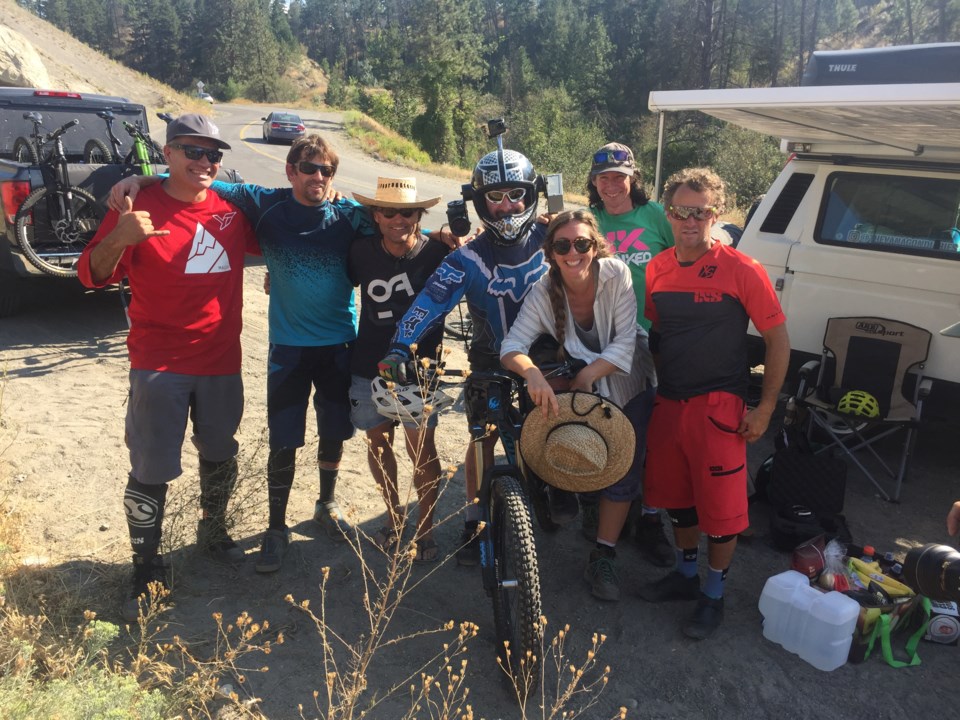Every year when Crankworx descends I get nostalgic. So let me tell you a little story.
Back in 2010, the induction of Rocky Mountain Bikes’ original “Froriders”—Richie Schley, Wade Simmons and Brett Tippie—into the Mountain Bike Hall of Fame was a deserved watershed in the sport. The Kamloops-born trio were boundary-pushing architects of mountain-bike freeriding, a movement responsible for everything from the wild success of bike parks and events like Crankworx and the Red Bull Rampage, to the movies we watch, the photos we venerate, the bikes we ride, and the way we ride them.
Though not alone in their influence, the Froriders put the “mountain” back in mountain biking at a time when a young sport seemed to have parked its potential with the debut of cross-country racing at the 1996 Summer Olympics. Mountain biking already had its fringe elements—trials-riding, downhill, dual slalom, 24-hour racing—but the industry naturally followed up the Olympic publicity by pushing the obvious athleticism of cross-country. In step, trail associations focused on creating user-friendly, erosion-resistant singletrack in cooperation with land managers and governments, looking to forge a reputation for mountain biking based on safety, respect and responsibility. Movies and magazines followed suit, creating an inertia that looked to control the sport’s direction. It wouldn’t happen: bombs going off in the B.C. backcountry would demolish that constipated vision.
In Kamloops, a group of renegade riders influenced by snowboarding and skiing were challenging themselves with steep descents on natural mountain terrain, clay badland features, and open gravel pits. There were high speeds, big air, BMX-style tricks, hellacious bails, and desperate edge-of-control riding. Often there was no trail. When there was, it appeared unrideable to any sane human. But these guys were figuring it out.
Simultaneously, on Vancouver’s dank and moody North Shore, a secretive group influenced by trials-riding were engineering and building wooden riding structures high above the rainforest floor. These technical webs of “skinny” trestles, beams and launch pads were incredibly difficult to ride—not to mention dangerous. They were also mostly illegal. But as images filtered out, the rogue builders—with nicknames like “Digger,” “Dangerous Dan” and “Johnny Smoke”—were referenced in hushed tones.
At first, these two separate subcultures were connected only by the spirit of freedom each fostered. But they were also both pariahs no one in the industry wanted anything to do with. That would eventually drive their scenes together, a passion-fuelled “moment” in 1996 to ’98 that could only have happened once. The more visible Kamloops crew led the way, their balls-out credo and stylish skills on natural terrain opening the doors to legitimize other local B.C. freeride movements (the one in Rossland foremost among them) and spark a worldwide revolution in riding. It’s a story filled with so much gravity and gravitas that a definitive movie was required to tell the tale.
Award-winning filmmaker and former mountain bike pro Darcy Turenne led the charge in crafting The Moment, a documentary that chronicles the lead-up to an explosion so massive it continues to reverberate as a bike-centric Big Bang. Dropped in November 2017, The Moment coincided with the 20th anniversary of Christian Begin’s groundbreaking (haha) freeride film, Kranked.
Coincidentally, 25 years ago it was phone calls from both Begin and Whistler photographer Eric Berger that lured me to Kamloops from my SoCal desk as Senior Editor of BIKE magazine into a world as stunningly fresh as it was terrifying. What I witnessed was so crazed that “Sick” became the logical title of the subsequent cover story in BIKE. Unbeknownst to any of us, the vision it portrayed changed the view of mountain biking’s potential: images of bikers dropping six-metre ledges and flying down off-trail talus were unheralded, improbable, even death-defying in an age where bunny-hopping was considered rad. But praise and respect wouldn’t come easy: this devil-may-care, landscape-ripping ethos was as upsetting to the mountain bike community as it was eye-opening. Bike companies and trail associations freaked out and lawsuits flew over everything from the controversial Greg Stump film, Pulp Traction, to which bike company owned the word “freerider.” To sidestep the minefield, Rocky Mountain busted out comical afro wigs and dubbed their new team Froriders, putting fun and faces to the huge descents, massive air, and maximum style of freeriding.
It was an auspicious start but it got attention. Kranked proved a mega-hit, forever changing the way mountain biking was marketed. Following Rocky’s lead and borrowing from snowsports, companies sponsored freeriders with film and photo incentives. BIKE found its identity in the exploding scene and top winter-sports photographers began shooting mountain biking in the off season. An industry that initially rejected “freeriding” was suddenly on a mission to bring it to the masses. The game-changing 1999 opening of the Whistler Mountain Bike Park channelled an amorphous groundswell into a profitable commercial wave. Critical mass tipped it all into the mainstream with events like Red Bull Joyride and the rest is history, as seen in the sport’s continued evolution, Crankworx World Tour, and interweb freeride edits.
What B.C. riders were doing on bikes in the mid-1990s was indeed sick in the colloquial sense, but it also turned out to be the cure for re-democratizing a sport.
Leslie Anthony is a Whistler-based author, editor, biologist and bon vivant who has never met a mountain he didn’t like.




